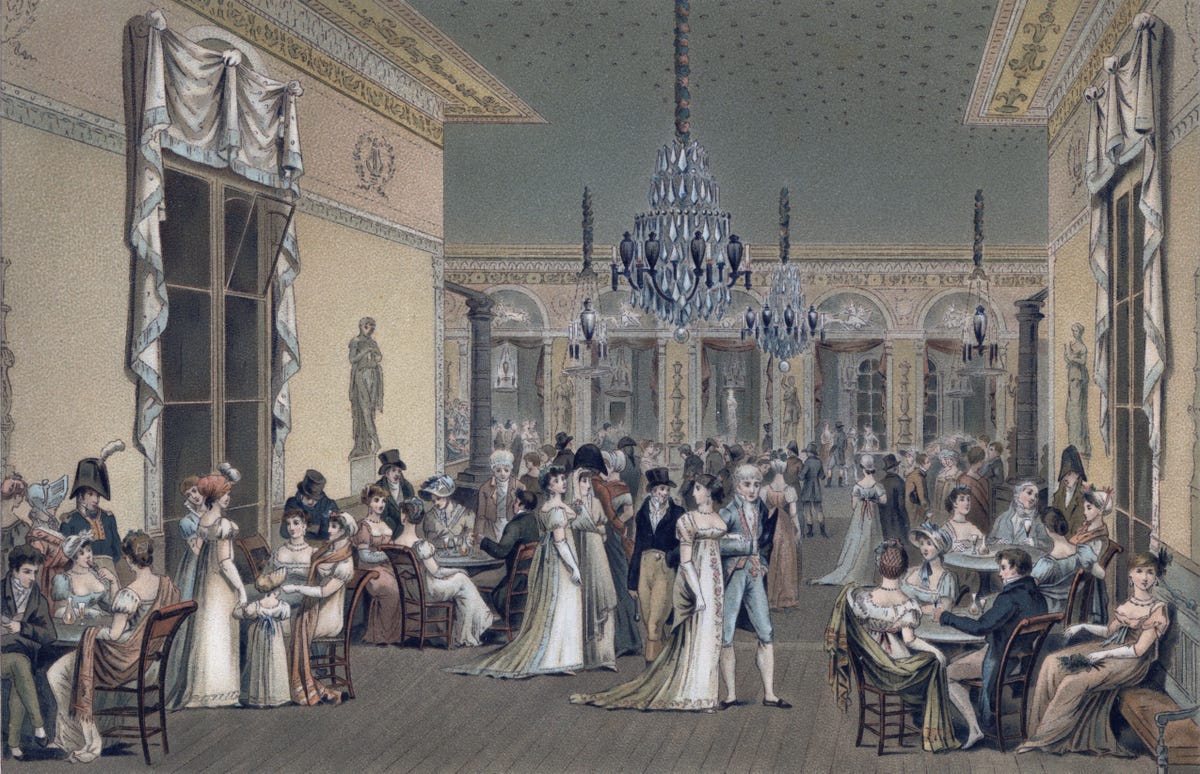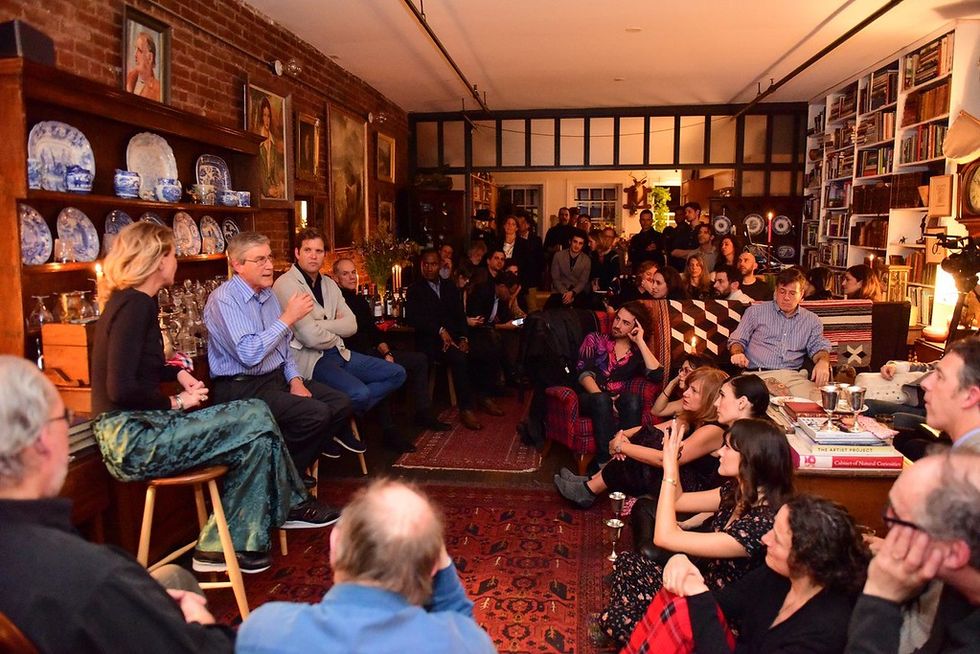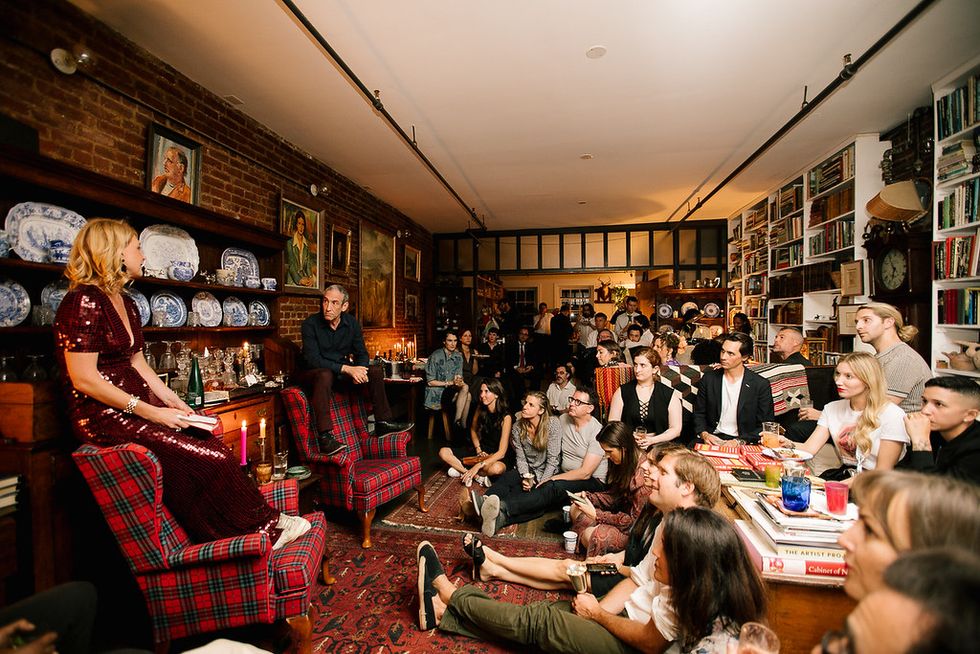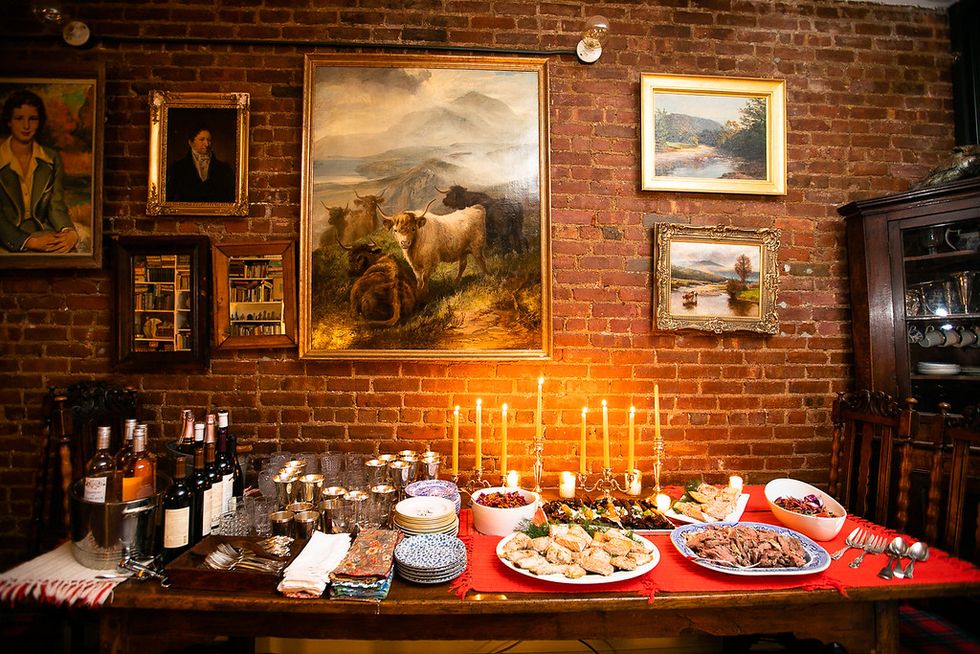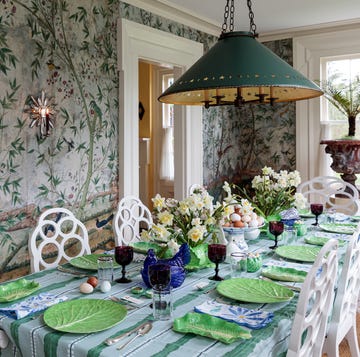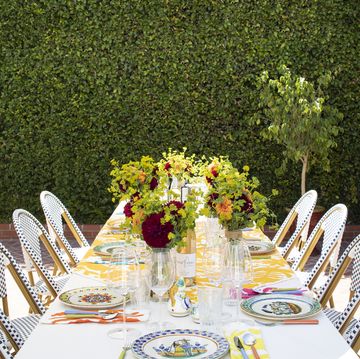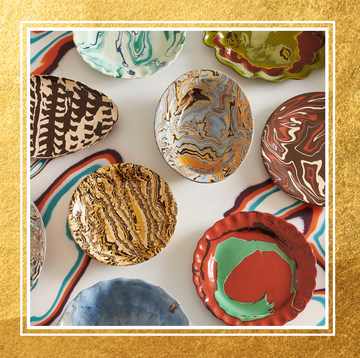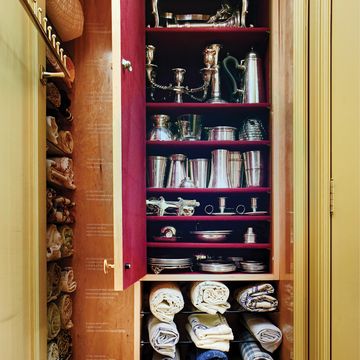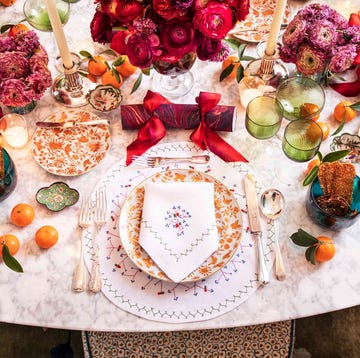While our modern society has experienced innumerable advances over the past few centuries, it has put into question whether our relationships and social connections have evolved for the better. The relatively new ability to hide behind screens and social media accounts and online discourse via digital public platforms about politics and social issues have created division between the best of friends and close family members. The convenience of texting and a plethora of social apps to communicate with makes in-person conversations between friends, family, and colleagues fewer and far between, something the pandemic hasn't helped.
As our world is still in disarray from the pandemic, we have to be mindful of the ways we gather. However, our world is also desperate for in-person conversations and emotional connections, creating a need to step outside of our typical hosting boxes. It's time to think beyond the cocktail party and bring back the salon experience that originated in the 17th century as a lively (and live) social gathering that evolved into a safe place to debate, collaborate, learn, and expand one's perspective. No Facebook login or iPhone required.
A Brief History of the Salon
While the term "salon" wasn't coined until two centuries later, the first salons can be traced to the early 17th century, when French aristocrat Madame Catherine de Rambouillet's salon room became an intellectual hub for the Parisian intelligentsia to discuss social, political, artistic, and literary topics. The earliest salons were more informal and focused on entertainment, often featuring games and other light-hearted activities.
More From Veranda
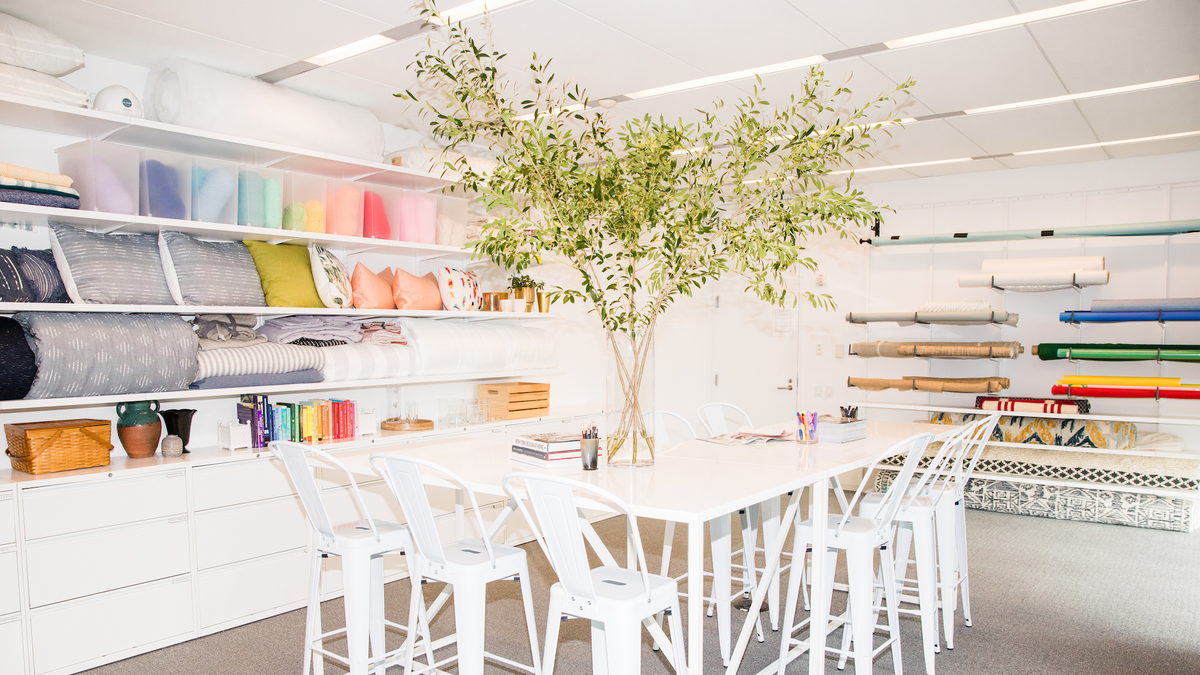
By the 18th century, the salon had developed into a more refined experience, in light of the political revolutions on the rise across Western Europe and the then–New World. These salons discussed everything from the Declaration of Independence and the U.S. Constitution (the French were on the brink of their own revolution) to the future of art. The innovative minds paving the way in the New World, like Benjamin Franklin, who often joined these salon discussions when in Paris, along with burgeoning creatives of the day like Victor Hugo.
One thing hadn't changed, however, and that was the tradition of a female hostess, opening the door to women becoming part of political, social, and artistic discourse and being seen as intellectual equals to men. These salon experiences were also expanding in location and invitees. Cities across Western Europe were bringing their own great minds together to discuss an array of important topics, while intellect and wit were becoming more of a priority for invitations than wealth and title. The Enlightenment found traction among the salon circles and created a new public sphere for a more inclusive elite than ever before on gender and socioeconomic levels.
The first half of the 20th century saw a rising interest in salons on America's coasts, with the last great salon taking place in the home of actress-turned-screenwriter Salka Viertel's Los Angeles home in the '40s. Viertel hosted a range of immigrant talents in the film and music industry, from actress Greta Garbo to composer Arnold Schonberg.
The art of the salon was soon lost, but its role in revolutionizing society and fostering deeper relationships is making the experience more relevant than ever.
Bringing the Salon Back to Our Modern-Day Social Calendars
"I think there hasn't been anything like a true salon taking place in a while," says PR- company-CEO-turned-lifestyle expert Susan MacTavish Best. "There's a great article from David Brooks that discusses the idea of individualism versus community and how American history has shifted to the time of the individual now, especially with social media and personal branding. However, war times are all about the good of a community, and we are currently coming out of a war in a sense, and it's a great time to restore that connection."
Best is on the forefront of bringing back the salon experience across the world, namely in the U.S. Best hosts salons with topics ranging from the microbiome to NFTs to the return of live music in 2021 and is making it her mission to equip other curious and creative minds to open their homes to a diverse group of new friends, ideas, and perspectives. Her company, Posthoc, works with companies and nonprofit organizations to host salons with the purpose of generating new ideas, stimulating outside collaboration, and expanding their professional and social networks.
"I started my own PR agency in Silicon Valley when I was just 23, and everything I did was from my one-bedroom apartment," says Best. "I cooked and made cocktails and everything was done over food and drink in my own home. I did this a few times a week for 20 years, and my home just became a hub where deals were done and interesting people would hang out. I'd been hosting salons for years without realizing it."
After building a diverse network of artists, journalists, venture capitalists, and everyone in between, Best launched into the next phase of her career, offering her salon expertise; covet-worthy social networks across L.A., San Francisco, New York City, and London; and her culinary skills to help companies, communities, and organizations foster real change. She works with them for a minimum of a year, as she believes you can't build lasting community in a random, one-off event. And she says, as an individual, there has never been a better time to grow your role as an active community member than right now.
How to Host a Salon at Home
"It has been such a terrible time for people this past year, and now seems like the time to bring people together, but in a way that means much more than a perfect dinner party for 12 people with the perfect setting and perfectly pressed linen napkins," says Best. "I love a dinner party and collect tableware, but we need more of these driven conversations that are more focused on learning from each other and asking questions and occur on a regular basis."
Here, Best's top tips for hosting your own salon that will have you wondering why you never tried your hand at it before.
Tap into Your Community to Decide on a Topic of Discussion
The most intimidating part of salon hosting may be your first step: choosing the topic of discussion for the evening. Best says this doesn't have to be complicated and advises finding inspiration from thinking through what's happening in the world or within your community right now, concepts your circle of friends is interested in, or even a topic you aren't well-versed on and wish you knew more about.
"My recommendation is to always be reading and aware of your surroundings," says Best. "If you're not a curious person, a salon is not for you. If you're doing this to social climb, just host a dinner party, but if you have a real point of view and want to learn, this is a great way to do so. What are people talking about? What's of interest? Tap into your friends and community to figure that out."
Best's lifestyle site, the Salon Host, features an article with 21 salon topic ideas to get you inspired for hosting your own educational yet exciting evening.
Lean into Local Experts and Talent
Once you've tapped into your network for what the topic du jour will be, Best advises leaning in further to your greater community to find the right local expert to facilitate thoughtful, intelligent discussion. Whether it's a local professor, author, artist, or entrepreneur, take some time to research and connect with your desired facilitator to make sure they are the right fit for the evening.
"I love knowing their backstory ahead of time so I can weave it into questions throughout the night," says Best. "I usually ask my expert five questions that range from their point of view on the subject of discussion to their professional experiences and what they did for Sunday dinners growing up." Best is adamant that a salon is not just about stimulating a completely intellectual discussion; it is also about creating an emotional connection with the people you have gathered together.
Best also enjoys supporting local musicians and hiring them to play throughout the evening, be it a DJ or a string quartet. She says especially now, as artists have suffered so much without in-person performance opportunities, this is another great way to give back to the community while plugging yourself and your guests deeper into the creative network within your city or neighborhood.
Curate a Well-Balanced, Diverse Guest List
Speaking of the people you've gathered, you'll need to throw out your typical dinner or cocktail party criteria of who to invite when it comes to hosting a salon. In order to stimulate the best possible conversation and create lasting connection, Best advises stepping outside your network a bit in order to make the night magical.
"I try to get three generations of people there," says Best. "You could come across multi-generations in church and more tight-knit communities back in the day, and as our society values those things less, we have to work harder to find that kind of dimensional community." While she is used to hosting 100+ guests at salons [prior to the pandemic], Best recommends inviting 8 to 12 people to your first salon and reassessing how you want your next one to grow in size from there, if at all.
Best notes that hosting salons becomes a self-fulfilling exercise, in that as you start putting these on and leaning into your curiosity, you will also become more curious and open to meeting different kinds of people across varied backgrounds and professions. This isn't a dinner party where you want to put your best foot forward for your boss, their partner, and a few colleagues. This is a place where intellect, curiosity, and wit is valued over wealth and power.
"A salon will not be exciting if it's just full of journalists or doctors. You have to build an eclectic list," says Best. "Of course, this means also taking a look at one's own life and current role in your community along the way."
Plan an Exciting Yet Approachable Menu
Now for the fun and familiar, if you're a seasoned hostess: planning the menu! Best stresses the importance of ditching fussy food, a catering company, and precious bubbly for your salon. Though she understands not everyone enjoys spending countless hours in the kitchen, Best says there is something about preparing (or even simply plating) dishes for your guests that lowers any pretenses that your salon is a stuffy affair and puts guests more at ease with themselves and others.
"I've worked with a lot of billionaires, along with students and artists, who are really smart, and both are valued here," says Best. "Cooking food that you're about to serve takes away a lot of the pretentiousness. People wont be so jerky if you're cooking in front of them. You're literally breaking bread thats been made for you by the host. Be seen putting things out and handing it to them. It's not about standing around and being the most beautiful in the room."
While she prepares most of the menu in advance, there are always a few tasks Best saves for the day of. Since she often hosts on Monday or Tuesday nights, Best takes some time on Sunday to prepare a cocktail and a dish or two while saving simple activities like filling spring rolls or putting a salad together for the day of—even at the start time of the salon.
"I recommend some mindless cooking while people are there because its a lot to talk to people for an hour before you even begin the interview and discussion portion," says Best. "This keeps you occupied and gets a few people involved."
Best always ensures a few snacks are set out for guests to nibble on as they pour their first drink and get comfortable. For the meal, she advises leaning into elevated comfort food favorites, like a fancy mac and cheese or venison and wild boar meatballs to make everyone feel at home and at ease before the discussion begins.
Rely on a Few Trusted Guests to Make the Night Easy, Breezy
Because Best likes to finish her cooking at the start of the evening and actively serve guests their meal, she relies on a few veteran salon friends to arrive early and help her welcome guests and get the party started. Let them know about the new acquaintance you invited from the gym who may not know anyone or the guest speaker who also loves the Red Sox. That takes the pressure off you to use all your emotional and mental energy too soon while still ensuring connections are made and guests will be happy.
Once guests have had a drink or two and everyone has at least filled their plates, the interview portion begins, and these trusted guests can also help everyone settle and find a comfortable place to enjoy the upcoming discussion. Best will spend 25 to 45 minutes introducing and interviewing the night's guest speaker before the group discussion really begins, and these trusted guests can help ensure the conversation is started (and continues flowing) through the night.
"All the oversubscribing of our schedules and working 14-hour days is extremely short-sighted because nothing replaces locking eyes and making that emotional connection," says Best. "People need to take more control back of their lives and be active community members and participants in their own lives. Salons offer this by helping us prioritize connection, conversation, and community."
Lauren Wicks is a Birmingham-based writer covering design trends, must-have products, travel inspiration, and entertaining. She’s obsessed with globally inspired textiles, hosting dinner parties, and French cocktails.
